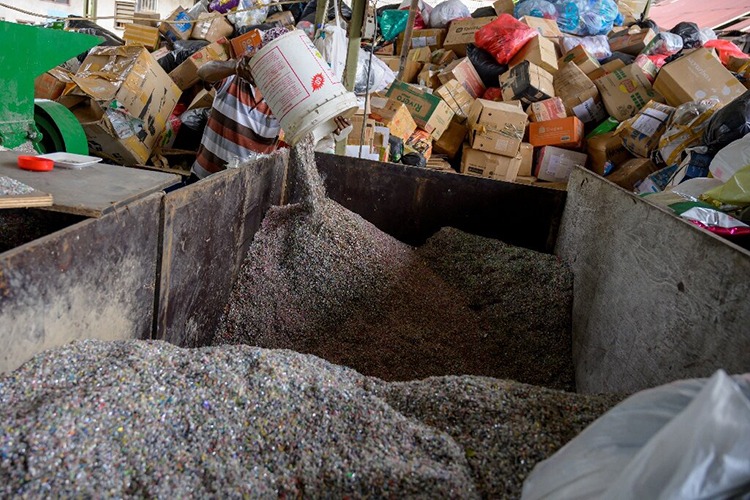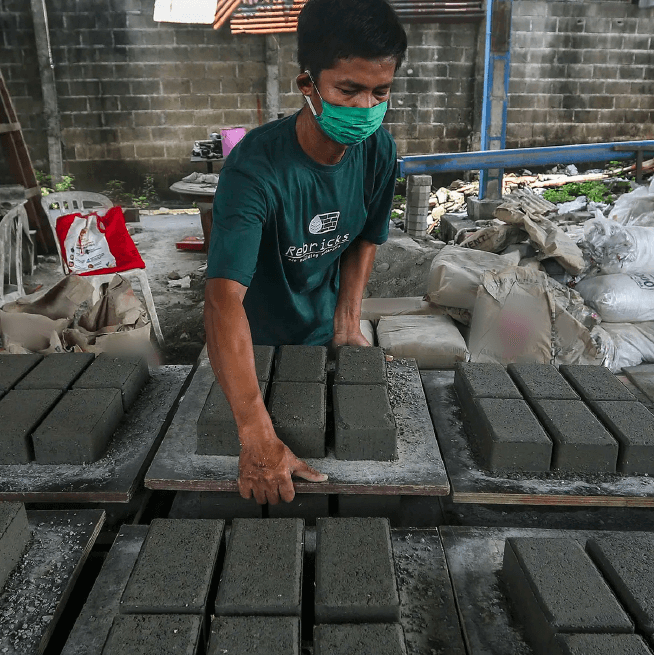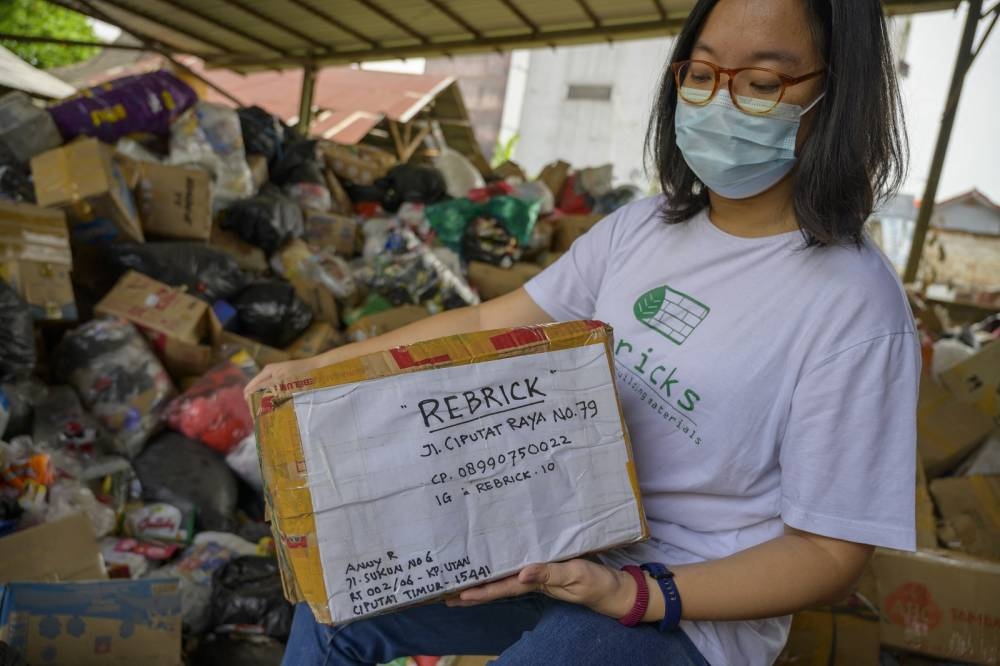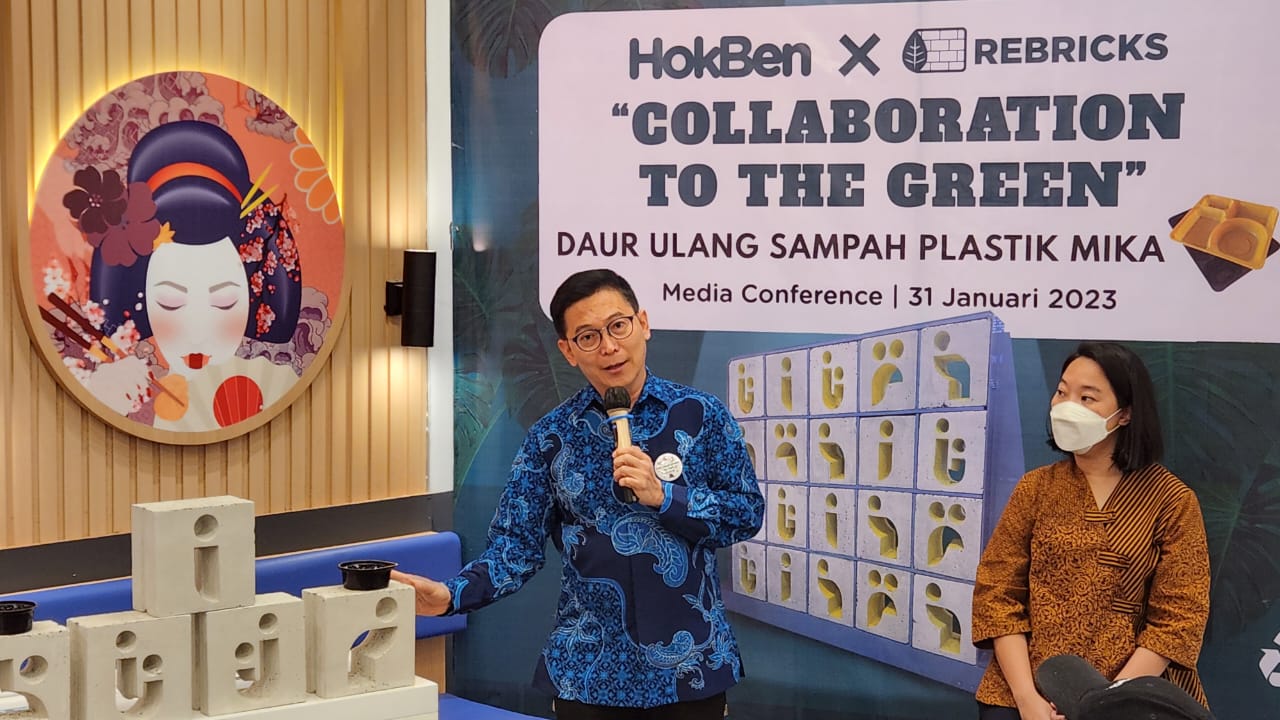Getting to Know Rebricks, Turning Disposable Plastic Waste into Building Materials
Rebricks said that he had processed 10 thousand kg of plastic waste into paving blocks from the 17,5 thousand kg of waste received from the community.
Plastic waste has always been a major problem in environmental pollution because it is not easily decomposed, the processing process is toxic and carcinogenic, and it takes up to hundreds of years if it decomposes naturally. Indonesia is a country that is still trying to solve this complicated problem.
Novita Tan and Ovy Sabrina, two friends who are concerned about this issue, decided to pioneer Rebricks, startups impact which recycles single-use plastic waste into building materials. This initiation started in 2018.
The solutions offered by Rebricks have won a number of awards, such as the Circular Innovation Jam 2020, Green Award 2022, ICLIF Leadership Energy Awards (ILEA) 2022, and the Tempo Circular Economy Award 2023. The product has also passed the Combusting Test British Standard 476: Fire test in building material and structure, Ministry of Industry's Pressure Strength Test and categorized in SNI class B criteria which are suitable for parking lots, pedestrian paths, and parks.
Rebrick's journey

Achieving a number of awards and certifications above is not as easy as turning the palm of your hand. Ovy and Sabrina had to go up and down to carry out research for 1,5 years in recycling multilayer plastic packaging waste or what is usually called Multi-Layered Packaging (MLP). This type of waste is difficult to recycle because it consists of several layers of plastic and other materials. This packaging is usually found in daily necessities products, such as instant noodle wrappers or shampoo and coffee sachet.
Report Greenpeace in 2019 entitled "Throwing Away The Future: How Companies Still Have It Wrong on Plastic Pollution Solutions" conveys as many as 855 billion packages sachet circulating on the global market at that time. Southeast Asia itself holds a market share of around 50%. Predicted number of packages sachet sales will reach 1,3 trillion in 2027.
This problem with MLP is a challenge in itself in efforts to recycle waste, because there are still few parties who accept and manage the waste.
“Our initial mission was to create products that were not disposable. "Because there is a lot of supply, coincidentally our co-founder [Ovy] has skills in the field of building materials construction, so we have access to explore there," said Rebricks Co-Founder Novita Tan to DailySocial.id.

In the R&D process, it is not easy to find the right formulation because you have to go back and forth from research to research to get the desired results. For the process itself, the plastic waste is shredded, mixed with other materials, compacted (media), then printed.
"What's interesting is that we use green methods, so in every process we don't have any melting. "Usually a lot of waste processing requires burning first, but if we go from start to finish there is no such process."
Rebricks' first product was paving block. The second product was the brick which was released a year later, and finally the roaster. Paving blocks made by Rebricks can last between 10-20 years, can withstand loads of up to 250 kg/cm2, and weighs 2,2 kg less than conventional ones of 2,5 kg.
From the outside, paving block made by the company is the same as in general, the aim is to make it easy for workers to use it. However, if you look closely, you will see small pieces of plastic. Even so, in fact the function is the same, it can be used for parking and roads.
This entire process is carried out at the Rebricks workshop located on Jalan Ciputat Raya No. 79, South Jakarta. There are three machines capable of producing 80 meters paving block of 80 kg of plastic waste for full capacity calculation. Meanwhile, the Rebricks team consists of 15 people.
In collecting plastic waste supplies, Rebricks utilizes a self-built community called Rebrickers. Most of them are households who are aware of sorting their own plastic waste, but are confused about what to do with the waste and voluntarily send it to drop points Rebricks.
"From our data, they are not only from Jakarta, but also from Java, Sulawesi, Sumatra, who are willing to send it themselves even though the shipping costs are more expensive. They already are aware but I'm confused about what to do with it [the waste].”
Rebrickers' high enthusiasm means the company has excess supply due to continuous shipments. This overflow is due to the fact that there are no longer places that accept single-use waste shipments. To overcome this, the company finally limited the waste it could send to a maximum of 5 kg per month for one household.
“Every day we receive 50 kg of waste coming in. The challenge is because there are not many actors [who can accept it] so they [Rebrickers] keep sending it, while we have to adjust to demand also because it's everywhere for sure supply definitely more than demand. "
To resolve issues demand, the company utilizes both B2C and B2B models. The company sells its products at competitive prices. Purchasing is also relatively easy, just call the WhatsApp number listed in the Rebricks site catalog.

Starting from its founding in 2018, as of today (3/2) the company has processed 10 thousand kg of plastic waste into paving blocks from 17,5 thousand kg of waste received from the community.
Novi admitted that the buyers also came from outside Jakarta, such as Merak, Surabaya and Bandung. They are willing to pay more expensive shipping costs because they think that what Rebricks offers is environmentally friendly, not just paving blocks normal. The business contribution from B2C and B2B is considered equally capable of enabling the company to continue running operations, even though he goes into more detail with numbers.
Collaboration with B2B
One of the recently announced B2B collaborations is with Hokben. For the first time, Rebricks will process mica or PVC (Polyvinylchloride) plastic. This type is difficult to recycle because it emits dangerous substances if processed incorrectly. The recycled result of this collaboration is a roster to beautify the interior of the HokBen outlet.
Roster is a wall component that functions as a vent that helps air circulation, beautifies the walls of the house to add ornaments to the walls of the house and improves room lighting to save on lamp usage, thereby helping to save electricity usage.

In general, rosters are made of clay, brick and concrete. HokBen and Rebricks made a roster with one of the ingredients being HokBen food packaging waste made from mica. 1 roster made contained 10 pieces of used HokBen mica plastic waste.
The collaboration, which will last for one year, targets being able to process one ton of used HokBen plastic mica waste. Not only the roster, both companies will continue to increase their waste processing targets and will continue to develop to create other product variations.
Before it was inaugurated on Tuesday (31/1), Hokben had already done it pilot project for the previous 1,5 months. From there, 300 kg of mica plastic waste was collected which has been used in 11 HokBen outlets as part of the room design. The total waste used reached 16.380 processed used mica plastics or the equivalent of 128 kg.
Operational Director of PT Eka Bogainti (HokBen) Sugiri Willim said, "We invite the entire community, especially loyal HokBen customers to take part in returning used HokBen plastic mica waste that has been cleaned to all HokBen outlets in Indonesia."
Previously, Rebricks had also carried out several B2B collaborations. One of them was with Novo Nordisk to build two bathrooms and two toilets in Pemulung Village, then Hush Puppies Indonesia built two bathrooms, an area for washing, a well, pipes to supply water, and septic tanks in Panagan Village, Bogor.
Next plan
In the future, Novi wants to improve Rebricks products, including increasing compressive strength. Rebricks' compressive strength is currently at 250 kg/cm2, so it is not enough to enter the SNI class A building material criteria. In addition, the company will increase the variety of building material products so that recycled products can be utilized more massively.
Currently, the company has received several grant funds from Malaysia and non-profit organizations. This year, Novi revealed its plans to raise funding from venture capital.
"Three years ago we built ourselves, prepared the product so we could attract investors who have the same vision. "This year we will slowly open ourselves up [to investors]," he concluded.
Sign up for our
newsletter
 Premium
Premium
